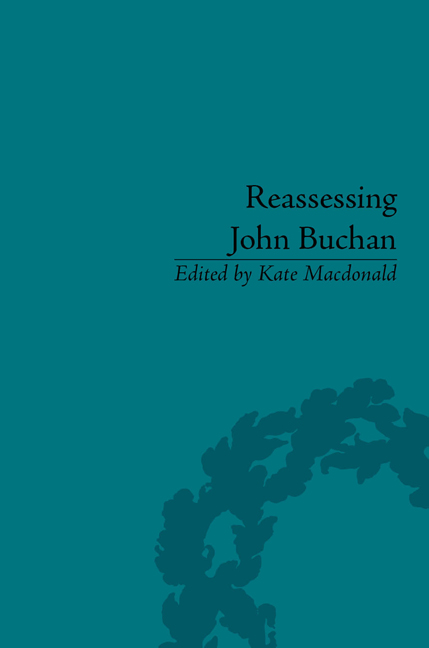Book contents
- Frontmatter
- CONTENTS
- List of contributors
- Introduction
- I Cultural Roots
- II Divided Loyalties
- 6 John Buchan and the South African War
- 7 John Buchan and the First World War: Fact into Fiction
- 8 Buchan and the Pacifists
- 9 John Buchan, America and the ‘British World’, 1904–40
- 10 Islam and the East in John Buchan's Novels
- 11 Conquistadors: Buchan's Businessmen
- III Literary Art
- Notes
- Works Cited
- Index
10 - Islam and the East in John Buchan's Novels
from II - Divided Loyalties
- Frontmatter
- CONTENTS
- List of contributors
- Introduction
- I Cultural Roots
- II Divided Loyalties
- 6 John Buchan and the South African War
- 7 John Buchan and the First World War: Fact into Fiction
- 8 Buchan and the Pacifists
- 9 John Buchan, America and the ‘British World’, 1904–40
- 10 Islam and the East in John Buchan's Novels
- 11 Conquistadors: Buchan's Businessmen
- III Literary Art
- Notes
- Works Cited
- Index
Summary
Introduction
By 1900 the British Empire had spread into many continents and controlled many different nations, hoping to make use of their unexploited wealth and to ‘secure to Great Britain the freedom to sell all over the world the products of her growing interests’. The British politicians and intelligentsia who theorized the ideologies of the Empire, played a major role in maintaining, expanding and strengthening the British Empire as well as managing the affairs of the colonized peoples. John Buchan, a prominent empire commentator in the Edwardian period, was strongly influenced by the ethos of Empire in his early fiction and polemics. In the 1916 ‘Preface’ to the third edition of A Lodge in the Wilderness (1906), Buchan said that ‘our Empire is a mystic whole which no enemy may part asunder, and our wisest minds are not given to the task of devising a mechanism of union adequate to this spiritual unity’. Hence, the ‘wisest minds’ had to have a duty towards the Empire, impelling them to ‘devise’ methods and ‘mechanisms’ to strengthen it.
This emphasis on a spiritual dimension to the British people's ‘duty’ to maintain the Empire can be connected to the other important forces, beside the pursuit of free trade, that determined the makeup of the British Empire. These were ‘the impulses of evangelical religion’ and the ‘missionary societies’. It was claimed at the time that Britain had a divine message that must be achieved because it was God's will. In the 1920s Edward Byers made a comparison between the Israelites and the British, in the sense that both were chosen by God and had ‘the temporal blessings’ of ‘the possession of certain land’. Byers argued that Britain must be ‘the greatest on earth’ and that ‘the greatest race on earth is the Anglo-Saxon’. In brief, Christianity and commerce were the decisive factors and forceful motives that shaped the British Empire.
- Type
- Chapter
- Information
- Reassessing John BuchanBeyond the Thirty Nine Steps, pp. 117 - 128Publisher: Pickering & ChattoFirst published in: 2014



